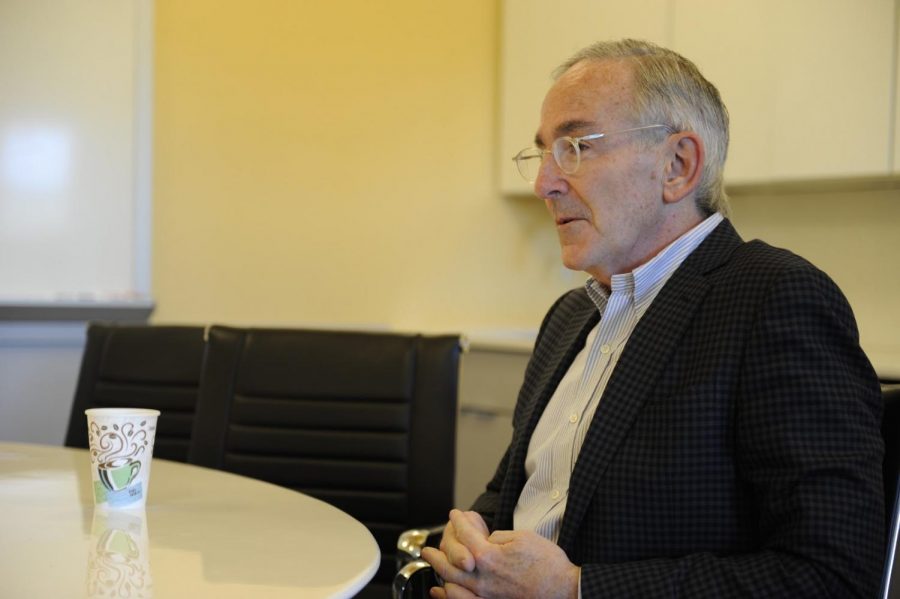Eric Rose ’68
Pioneer in Surgery and Science
Dr. Rose reflects on his involvement in the field of cross-species transplantation.
Eric A. Rose, M.D., a world-renowned pioneer in surgery and science, returned to Bronx Science on January 10, 2018, for his induction into The Bronx High School of Science Hall of Fame. Dr. Rose currently serves as the Edmond A. Guggenheim Professor and Chairman of the Department of Health Science & Policy and Associate Director for Clinical Outcomes at Mount Sinai. Dr. Rose, a member of the class of 1968, is being recognized as one of the eighty most distinguished alumni to be honored for Bronx Science’s 80th anniversary.
Since leaving the halls of Bronx Science, Dr. Rose’s career has been defined by innovation. After earning his medical degree from Columbia University, Rose fulfilled several residencies in general surgery and thoracic surgery at then-Presbyterian Hospital. Only thirty-one, Rose was appointed to direct the Columbia-Presbyterian Medical Center’s heart transplant program in 1982. While working as a surgeon, still very early in his doctoral career, Dr. Rose was faced with possibly the biggest challenge any doctor at the time had seen thus far. In 1984, Dr. Rose was assigned a four-year-old patient who had been born with a single ventricle in his heart, with the chances of his survival with this defect being unimaginable.
Although Dr. Rose had done about twenty heart surgeries on adults up until that point, he had never performed a transplant on a child. In this situation, Dr. Rose and his team were not so much worried about the surgery itself as they feared the recipient’s immune system would reject the new heart. Only a few years earlier, the immunosuppressant cyclosporine was undergoing clinical trials at Columbia with the intentions of inhibiting the body’s immune response to prevent organ rejection. Despite the drug receiving approval from the F.D.A. in 1983, the team of doctors were anxious about performing such an uncertain procedure and were searching for a healthy heart to use for the transplant. Luckily, they received one in time, enabling Dr. Rose to operate on the child.
On June 9, 1984, Dr. Rose wore magnifying glasses to examine the small heart during the surgery while his team balanced doses of cyclosporine. When they were finished, they had completed the first successful pediatric heart transplant. The patient went on to earn his master’s degree before passing away in his sleep, twenty one years after the surgery. With this breakthrough surgery, Dr. Rose not only gave his four year-old patient a second chance at life but also saved many other children in the process, with more than 5,000 pediatric heart surgeries being performed per year as of 2018.
In the lab, Dr. Rose has contributed to developments in the treatment of many diseases. His projects have received over $25 million in funding from the National Institutes of Health and over $100 million in federal grants as CEO of SIGA Technologies Dr. Rose’s team has proven the effectiveness of artificial heart pumps in improving life as part of his REMATCH program, and recently developed a cure for the smallpox disease that will help prevent it from becoming a biological weapon. Additionally, Dr. Rose has worked on the developing field of cross-species transplantation, or translational surgery, which utilizes primate hearts for human transplant recipients. His research has been widely cited by other scientists and publications and has appeared in more than 3,000 articles.
Upon enrolling at Columbia University in 1968 (in the midst of a wave of student uprisings), Rose realized how poor his writing skills were. Early on, Rose joined the Columbia Daily Spectator to learn how to write. The humiliation of seeing his articles “torn to shreds” every night by his editors gave Rose a greater control over his words – an ability that proved to be immensely helpful once he became a doctor.
“I learned how to put together a story and a coherent piece of writing, which, if you’re interested in science and academic medicine, you have to learn how to do,” said Rose.
A self-proclaimed “serial opportunist,” Dr. Rose’s interest in medicine was initially piqued as a psychology major at Columbia after enrolling in a course called “Physiological Psychology” taught by respected psychologist Donald Hood, where he learned about color vision. In famed social psychologist Stanley Schachter’s class, Rose experimented with electrodes to control the feeding behaviors of lab mice, helping to contribute to Schachter’s theories and research on obesity. One of Dr. Rose’s proudest accomplishments is the construction of one of the best surgical departments in the world at the Columbia Presbyterian Center of New York Presbyterian Hospital. As the Chairman and Surgeon-in-Chief, Rose helped the staff build a “well-oiled machine with a lot of teamwork that effectively eliminated most of the competition.” At Columbia, Dr. Rose also became Director of the Surgical Cardiac Intensive Care Unit, Morris and Rose Milstein Professor of Surgery, and the Associate Dean for Translational Research.
As a student at Bronx Science, Rose was fascinated by material in his science courses and enjoyed lessons given by his social studies teacher, Mr. Stuart Elenko. During Rose’s senior year, he had an English class with Ms. Beatrice Gardner, whose teaching style helped Rose to find greater meaning in literature. “She had the ability to teach you to see more in a book than just the technical aspects, and she was a phenomenal person,” he recalled.
Many of Rose’s fondest memories at Bronx Science are from his experience in a rock band, called Metropolitan Blues Express. “At the time, we were diverse,” recalled Rose, “We had two black members, and three caucasian members — two were Jewish and one a Catholic.” Rose and his bandmates began playing together during their junior year and would practice on weekends. From being in a band, Rose also refined his ability to work well with others. “The way that a band works is that every band member makes the others so much better, like a collaborative enterprise,” said Rose. “It’s vehicle-building teamwork, where you cannot make any of the noise that you want to make alone, but what you could create together is what sounds great.”
Reflecting on his years at Bronx Science, Rose has no regrets. The “social and intellectual immersion” he found in high school brought him closer to different cultures and modes of thought. Rose advises current students to savor the moments that they have in their classes and with their friends. Attending a rigorous school can be tough, he acknowledged, but he said that students should take advantage of the many opportunities for growth and exploration. “Being smart is not a stigma or uncool,” Rose said. “It’s priceless. Just live it.”
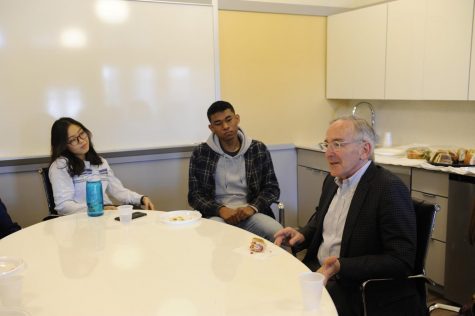
Rose shares lessons learned from his work as a heart surgeon and researcher with Jenna Jung ’18 and David Ologan ’18.
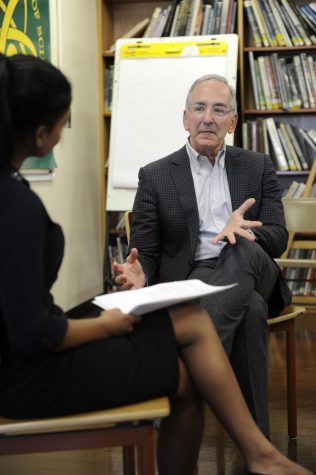
Rose fields questions from Kathryn Varghese ’18 about his experience completing the world’s first pediatric heart transplant.
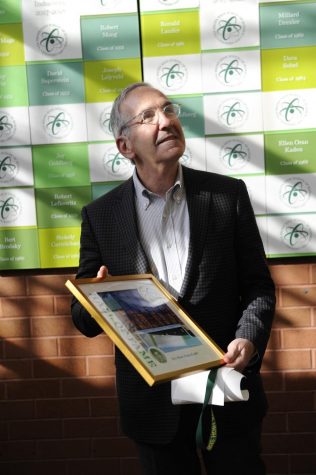
Eric A. Rose, M.D., joins the Bronx High School of Science’s Hall of Fame, created to recognize the most notable graduates of the past 80 years.
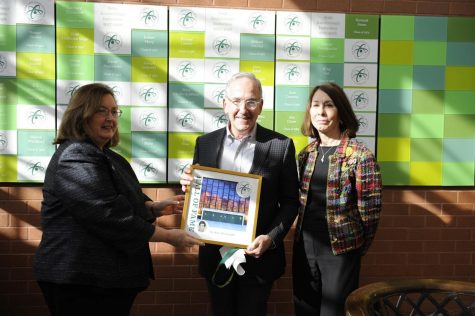
Eric Rose receives his Hall of Fame award from Principal Jean Donahue alongside his wife.
James Snyder is a crossword editor and Staff Reporter for ‘The Science Survey’ as well as a Student Life Section Editor and sports photographer for...
Victor Tesoro is a Chief Photographer and Photo Editor for ‘The Observatory’ and ‘The Science Survey.’ His job consists of taking, editing and...
Ben Wade is the Chief Photographer and Photo Editor for both ‘The Science Survey’ and ‘The Observatory’ yearbook. He takes photos of students and...

